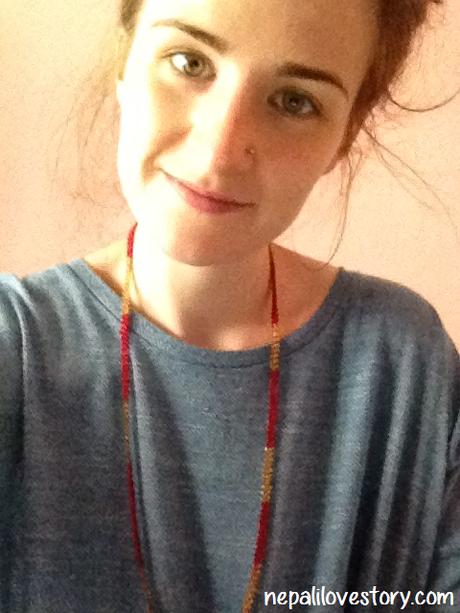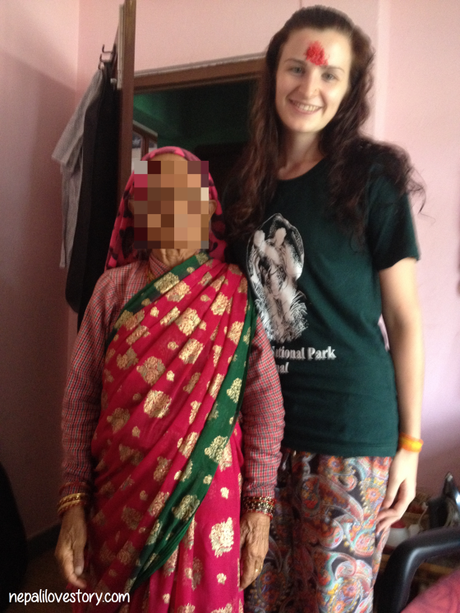M’s family is a joint family… and his grandparent’s live with him as well. Hajurba (M’s granddad) is nearly 100 years old and Hajurama (M’s grandma) is not too far behind him. One hundred years ago in Nepal, things were incredibly different – especially for Brahmin Nepalis who believe in very traditional ideas and are strict Hindus.
Meeting Hajurba and Hajurama was the thing I was most worried about the most when I arrived in Nepal. I was even more worried about meeting them than I was his parents! At times it was very difficult, specifically at the beginning, which you can read about here.
However, toward the end of my stay in Nepal, Hajurama and I were growing very close. She had given me her potey (special necklace for married women), she referred to me as M’s wife, and she would drink tea which I prepared for her (which was a big step as Brahmin’s don’t like other castes being in the kitchen let alone touching anything inside).

Hajurama’s potey that she gave me!
She would care for me when I was sick – even in her old age. In turn I became comfortable around her and would wander upstairs to find her on the balcony. I helped her pick out the bad grains of rice and asked for more of her homemade rotis when we ate lunch.
In fact, Hajurama was the only one I would happily practice my Nepali with – even though she had a village accent that was more difficult for me to comprehend. Still, she would look on with understanding and love when I tried to talk to her. She would help me and try to comprehend what I was saying, even when I mixed up verb conjugations and muddled my way through sentences that a child could match. She never once laughed at me or made a fuss about me learning or getting things wrong.
For complex talks, I had to ask M to translate between us so we could chat as much as we both wanted to but were not able to. She told me her life story; the sad and painful parts and the happy and wild experiences. She gave me her insight and her knowledge. Hajurama even told me, through M, that she would be happy to eat a snack if I prepared it for her (as long as it was not rice and dal as that is still sacred).

My sketch of Hajurama surrounded by people who love her (as always).
I felt like I lived parts of her life through her shoes as she never left detail out, especially towards the latter years of her life. I heard her daily routines and friendships in the village in Chitwan as M was born and how she cared for him when he was a child.
I understood from her that she and Hajurba even traveled to England with the help of uncles, she wanted to stay for longer but Hajurba had enough so they had to go home. She confided in me about her aspirations to go to America one day to see one of her other sons. I, in turn, invited her back to London and told her I wanted her to visit!
The amount Hajurama and I compromised and adapted with each other whilst I was in Nepal was amazing. We grew closer every single day. Also, she gave me the patience and strength to realize that it would take time to make my mark and settle in to a life as a buhari/bhauju in Nepal.
If a village born, traditional, Brahmin old woman can learn to love and adjust then anyone can.

Hajurama and I. Relationships do really spring up in the strangest places!

